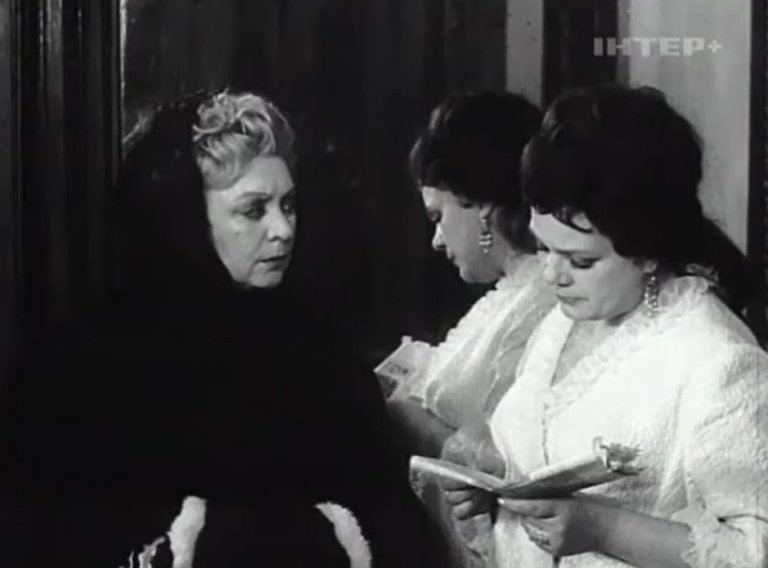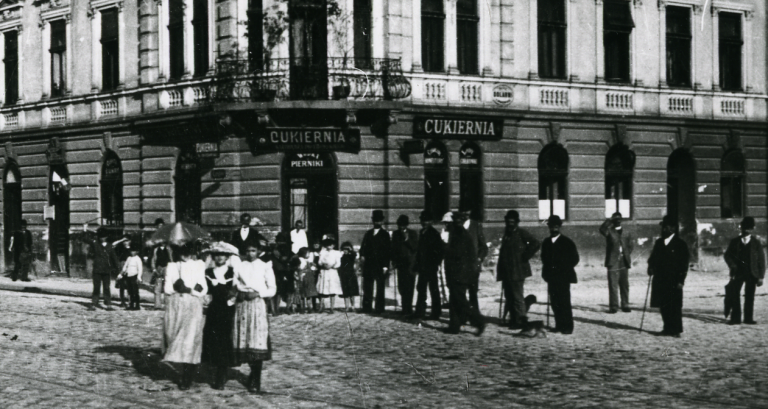O.Halychanka
Some Notes Relevant for the Season
What would our highbrow intellectuals spend money for, and I mean the highbrow member of intelligentsia who does have a little excess of money rather than to cover daily bread alone? Men (with few exceptions) – the more money they have (their own or borrowed), the better they eat and drink! With the general neglect for culture related issues, it is regretfully so! Starting with a simple vodka (“for breakfast”) with a piece of sausage or pickled herring, with the increasing income, those lucky devils end up with liquors, cognacs, caviar, lobsters, and champagne. The more money, the more intensely they would explore art and women: in theaters, casinos de Paris, and God knows where else! We, women, falling behind the times, would not know. But let’s forget about them! Why would the matrons judge about the sophisticated deeds of the “lords of nature.” We’d rather take care of ourselves and see into what women do with the money, when she has a rich daddy or husband, or the independent lady who would provide for herself?
It’s easy to guess as it strikes the eye immediately: she would dress prettily. That is right! Take a closer look and you will see the lucky ones and recognize them by the broad brim hats decorated with the expensive ostrich feather, by the luxury suits, etc. Well, it is not detrimental to physical or mental health, and it certainly is not the reason to shame the innocent young generation about. However, if one tries and does not buy one such extra dress with the hat to pair with, with the shoes and gloves, and if one tries not to choose the suit in the most expensive store, but save the money. Your, dear reader, might think I would advise you to spend this money on some patriotic or philanthropic goal, and you might not feel like reading till the end. But have patience! I know you are trying to donate as much as you can to all possible patriotic causes, and I would not even make any calls for any such projects. What I suggest is to spend this money for the truly selfish purpose — I literally recommend you travel the world.
And also, as some might shout (and we do still have quite many of them) how you should go without any aunt or mommy, or without any guardian? — Oh, no, you are trying to mock us!
— Without knowing the foreign customs, or the foreign language? Others, who are too cautious and careful, would say they would never risk it.
— How come? We might be pickpocketed, or trafficked and sold to harem, or villains could cut us into pieces. — And the slightest mention of these topics would make the ladies turn pale, and those ladies would mostly be the ones who are most valued and desired by men for their genuine womanhood.
At a first glance, it does not sound like true but it is only the first impression. In reality, the situation looks different. Mommies or aunts as chaperons have come out of fashion abroad, and they never act in such outdated roles any more. There, they would say the heresy that if a person does not have respect of herself then a dozen of aunties are not going to take care of her. So, leave them alone. Let them watch the ashes of their home fire. On the other hand, you should try to take some courage and be a free person. The role is so attractive and easy to enjoy that you would never want to reject it once tried.
As far as ignorance about foreign customs and traditions, they are easy to learn (since those are fixed things) thanks to the ingenious invention of Guttenberg. As to the foreign language, you can use as a basis the German language that each of us speaks at least a bit! It does not require understanding some philosophic treatises (they also say it is no good for a woman to understand, even harmful!), but only some everyday phrases, to manage around. It is like the main capital while the small coins will be in little awareness of the language of a country you wish to visit. You do not to learn much, it will take a dozen of days to get a flair of the language with the help of a dictionary and phrase book of “Polyglot Kunze” per 50 pfennigs. You just need some expressions such as numbers, hours, and days, and some most useful phrases such as “How much is this?” “It’s too expensive!” (the latter supplements the former!), “How do I get to the railway station?”, “ Do you have a room to rent?”, “I want to eat” etc.
This will suffice, I tried it myself when in Italy, France, Russia, and Hungary, and I managed quite well.
The worst case is about those “most genuine women” who intimidated us with all kinds of villains, outlaws and other creations who are not willing to work but only shamelessly rob people. It should not be underestimated, and it is not fake, because we can read every day in street papers. What do you do about it? The worst thing is that I have never seen any such cases whenever I travelled. That is why I can hardly say anything about any precautions to take. But I think you do not necessarily need to come across them, either. Right? Let them go whither they will.
Do you know what you could do not to have a villain catch a glimpse of you? I will give you a tested recipe that has always helped me.
So, you need to leave at home the expensive dresses that catch the eye but rather wear some modest practical inexpensive clothes.
The broad-rim hat, whatever beautiful flowers or feathers it has on, must be sent to the attic! For a trip you should take a practical and inexpensive sport cap. All kinds of gold, pendants, or rings that may attract the villain shall be sent to he… pardon my French, they must be sent to your jewelry box and left home.
If a female tourist is dressed like that, instead of weapon or a boxer piece (even though it is not prohibited for the true emancipated women, especially for those who are skilled in wearing such things), she will build some good trust with people and learn by heart the quotation of a fisherman from that Gorky fairy tale: you should always hope for the good in people, and the good will surely happen!
When you overcome this major challenge and also learn some things about the country and the region you plan to visit, you still need to address a financial matter. In this regard, I can assure you that when a person only wishes to travel, learn and see the world, rather than consume and indulge, they would manage with the small cost even on the longest trip.
A hundred or two will be enough to see and learn some interesting things. And the short trip (after you arrange your passport) to Kyiv, Kaniv, or Odesa might cost as little as several guldens.
And there will be so many impressions, the luxury of watching the sea, the Dnieper, and the ancient Kyiv itself…
There is also Tirol, Italy, the Baltic, or the Dalmatia? What kind of new worlds and new perspectives they can reveal to us!
It takes a dozen of hours to debunk the myth about the Galicia itself. It does not matter that the map shows a small piece of land; it is one thing to see it on paper, and it is a different thing to experience it ion person. You get on the train in the evening in one end of the country, and in the morning, you wake up at the border and be surprised to realize whether this little piece of land may host so much misfortune and misery?…
As soon as you get beyond Galicia, whatever direction you take (e.g. Austria), you immediately see the difference in how the area is maintained, in the local culture and population, in their customs and traditions. When you compare it all with the destitution we have, you will get so many new conclusions…
Then you come to a foreign city.
The power of people who are foreign to you, who you have never known before, who speak a language you hardly know, will encompass you as a strong sea wave. You will not have to pay extra effort, as it might happen at home, you will not have to scatter your focus on the content of the conversation; you will be able to be there as an observer of another world, and see many interesting customs of the nation, their typical features and ways. You will see something like the moving pictures “from nature,” from the living cinema. And the impressions will be so rich exactly because the language will not distract your attention.
And the need to cope on your own, to get through the unknown circumstances by yourself, will highlight your new qualities you have never suspected you had.
In this new and interesting environment, your household problems, with all the servants, house chores, burnt dinners, or the impossible neighbours, gossips, seamstresses and tailors, and all other routines that you have grown to enormous dimensions because of lack of ventilation for your soul – all of those will immediately go down to your feet and embarrassedly take their deserved place.
Even your undeniably high mister directors, inspectors, chiefs, and other proud senior leaders of the world will be oddly belittled and unexpectedly appear to you as common lesser mortals, like all other ordinary sinful people.
And you will notice another thing that the careless and frivolous manner of treating women by men is the particularly Galician invention that could hardly claim a patent, because they say it is not a new thing but the remnants of the long-forgotten uncultured times.
In any case, outside Galicia many things will be seen in a different light, as if you lift some extremely magnifying glasses you used at home and finally managed to see the world with through your genuine eyes in this foreign land.




![Image for The Morality of Mrs. Dulska, 2013 TV Movie [Moralność pani Dulskiej]](https://edu.lvivcenter.org/wp-content/uploads/2022/10/moralnosc-pani-768x508.jpg)


The article was published in a free supplement to the Ukrainian-language daily newspaper “Dilo” [Affair] under the name “Zhinoche Dilo” [Women’s Affair]. The supplement was published every three months, during 1912, in Lviv. In the article, the author, a Ukrainian writer, journalist, and editor of this supplement, Olena Kysilevska, under the pseudonym O. Halychanka, writes about the benefits of travel for women. She refutes multiple prejudices that her female contemporaries were usually “intimidated with” as regards solo traveling. The target audience of her message included women from the “intelligent stratum,” essentially the Ukrainian middle class of the time. Despite this text’s light, entertaining, and somewhat ironic style, Olena Kysilewska, as an active member of the feminist movement, raises the issues that she thought essential to being publicly discussed. Proactive citizens, members of the “Women’s Community” (the forerunner of the “Union of Ukrainian Women,” the largest Ukrainian women’s organization in Lviv) that the author of the article was a member, along with Polish and Jewish women’s associations of the city, were advocating for the expansion of women’s suffrage. At that time, the possibility of voting and being elected was the most critical political demand of the organized women’s movement. As of 1912, Lviv remembered a series of women’s events dedicated to the issue. The question of personal freedom raised by Kysilevska and illustrated by immobility as an established norm for women of her social environment was certainly not limited to solo traveling. It concerns the more serious, strategic goals of consolidating women’s rights.